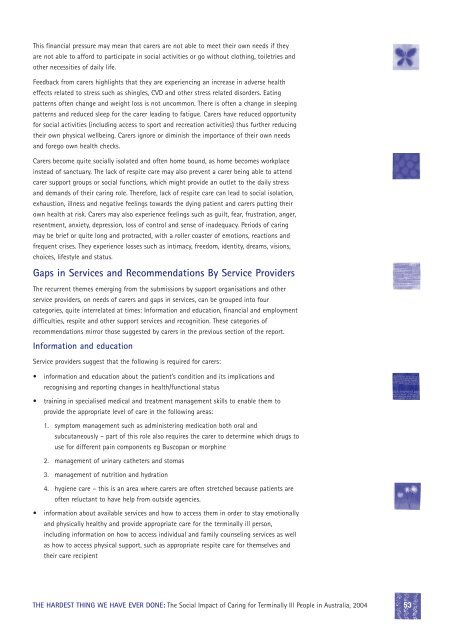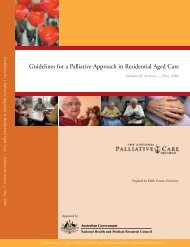The hardest thing we have ever done - Palliative Care Australia
The hardest thing we have ever done - Palliative Care Australia
The hardest thing we have ever done - Palliative Care Australia
You also want an ePaper? Increase the reach of your titles
YUMPU automatically turns print PDFs into web optimized ePapers that Google loves.
This financial pressure may mean that carers are not able to meet their own needs if they<br />
are not able to afford to participate in social activities or go without clo<strong>thing</strong>, toiletries and<br />
other necessities of daily life.<br />
Feedback from carers highlights that they are experiencing an increase in adverse health<br />
effects related to stress such as shingles, CVD and other stress related disorders. Eating<br />
patterns often change and <strong>we</strong>ight loss is not uncommon. <strong>The</strong>re is often a change in sleeping<br />
patterns and reduced sleep for the carer leading to fatigue. <strong>Care</strong>rs <strong>have</strong> reduced opportunity<br />
for social activities (including access to sport and recreation activities) thus further reducing<br />
their own physical <strong>we</strong>llbeing. <strong>Care</strong>rs ignore or diminish the importance of their own needs<br />
and forego own health checks.<br />
<strong>Care</strong>rs become quite socially isolated and often home bound, as home becomes workplace<br />
instead of sanctuary. <strong>The</strong> lack of respite care may also prevent a carer being able to attend<br />
carer support groups or social functions, which might provide an outlet to the daily stress<br />
and demands of their caring role. <strong>The</strong>refore, lack of respite care can lead to social isolation,<br />
exhaustion, illness and negative feelings towards the dying patient and carers putting their<br />
own health at risk. <strong>Care</strong>rs may also experience feelings such as guilt, fear, frustration, anger,<br />
resentment, anxiety, depression, loss of control and sense of inadequacy. Periods of caring<br />
may be brief or quite long and protracted, with a roller coaster of emotions, reactions and<br />
frequent crises. <strong>The</strong>y experience losses such as intimacy, freedom, identity, dreams, visions,<br />
choices, lifestyle and status.<br />
Gaps in Services and Recommendations By Service Providers<br />
<strong>The</strong> recurrent themes emerging from the submissions by support organisations and other<br />
service providers, on needs of carers and gaps in services, can be grouped into four<br />
categories, quite interrelated at times: Information and education, financial and employment<br />
difficulties, respite and other support services and recognition. <strong>The</strong>se categories of<br />
recommendations mirror those suggested by carers in the previous section of the report.<br />
Information and education<br />
Service providers suggest that the following is required for carers:<br />
• information and education about the patient’s condition and its implications and<br />
recognising and reporting changes in health/functional status<br />
• training in specialised medical and treatment management skills to enable them to<br />
provide the appropriate level of care in the following areas:<br />
1. symptom management such as administering medication both oral and<br />
subcutaneously – part of this role also requires the carer to determine which drugs to<br />
use for different pain components eg Buscopan or morphine<br />
2. management of urinary catheters and stomas<br />
3. management of nutrition and hydration<br />
4. hygiene care – this is an area where carers are often stretched because patients are<br />
often reluctant to <strong>have</strong> help from outside agencies.<br />
• information about available services and how to access them in order to stay emotionally<br />
and physically healthy and provide appropriate care for the terminally ill person,<br />
including information on how to access individual and family counseling services as <strong>we</strong>ll<br />
as how to access physical support, such as appropriate respite care for themselves and<br />
their care recipient<br />
THE HARDEST THING WE HAVE EVER DONE: <strong>The</strong> Social Impact of Caring for Terminally Ill People in <strong>Australia</strong>, 2004<br />
53
















